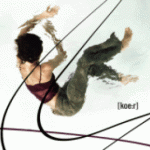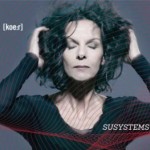Susanna Ridler’s Projekt [koe:r] on the gateway between Jazz, Elektronic, Avantgarde Pop und Improvisation.
Having returned from the US in 2001, Susanna Ridler decided to make the computer a key element throughout her composing process. She was especially eager to explore all the various ways synthetic sound patterns could be created, and continues to add new colors and inimitable stylistic elements to her very own pieces, as well as her cover versions of popular tunes. In search of her own unique way to combine the traditional with the modern, Ridler embarked on a long journey which led her deep into a completely new musical realm, and culminated in the creation of her own blend of Electronic Music, Jazz, Pop, Rock and Funk. Her band project [koe:r] symbolizes the end of this journey, – for now – and features collaborations with Austrian Jazz legends such as Wolfgang Puschnig, Peter Herbert, Gerald Preinfalk, Alexander Lackner, Florian Kmet, Thomas Gansch, Helmut Jasbar, or Rainer Deixler.
The self-titled debut album [koe:r] was released in 2008,
a second album “Susystems” followed in 2012.
[koe:r] (released 2008)

[koe:r] is an experiment, but still nothing is left to chance. The album is thorough contemporary examination of Electronic Music, Pop and Jazz, which uses the melancholy sound characteristics of late-nineties Downbeat and Trip Hop as a starting point. By using methods such as pitch bend, sampling, sound manipulation or time stretching, self-recorded audio material becomes something altogether different. This undogmatic approach makes for many surprising moments, and takes well-known songs such as Summertime, Fever, Comes Love, or Corcovado to a higher musical level. So new is the stylistic wardrobe Ridler designs for those “oldies”, so fresh their interpretation, that they sound like never-before heard material. And then there is Susanna Ridler’s voice, at times organic, then transformed into noise, which is the essential ingredient of this polyphony of musical ideas. Ultimately, the voice becomes part of the many musical layers within one and the same song that evoke not only emotions, but also satisfy the listeners intellect.
[koe:r] was supported by SKE Fonds ![]()
Reviews:
Die Presse (A):
Her mostly computer generated „slow motion aesthetic” exude that bewitching soulfulness
we know from Sidsel Endresen and David Sylvian.
Kulturnews (D):
Gershwin’s Summertime exists in over 10 000 interpretations but Susanna Ridler’s version stands the proof: the “downbeat dress” she provided the song convinces with callous charm.
Vogue (D):
Jazzy, intellectual, sensual
Now-on (A):
A refreshing, nimble, autonomous disc which makes one think of seaside and holiday without borrowing the „Café del Mar” cliché.
Musicchannel (A):
An access to music that is at the same time unusual and phenomenal how one wouldn’t expect it from this country. [koe:r] ripples like a waterfall. And this waterfall ripples incredibly delightful – and beautiful.
more here: Reviews
________________________________________________________________________
[koe:r] „Susystems“ (released 2012)

Today, in an age where an endless universe of musical history is at our doorstep through technology, one might be allowed to dream of creating the perfect blend of various styles; of reconciling the methodical approach that using a computer brings with it with the spontaneity that is the source of all real improvisation. For Ridler, this dream started off not as another form of fusion music created on the drawing board, but as pure emotion. “The emotions contained in the music range from melancholic to excited. I perceived them as early indicators of the direction a composition would take. They caused me to write motives, and triggered melodies, sounds, rhythms, thoughts or lyrics, all of which have the potential to again mess with one’s emotional undercurrents…” says the singer, who also wrote and arranged the album herself. “It is not until this battle between emotions and musical material is over, until all the different parts and elements, fragments and scraps, have been refined, redefined in the computer, that a song is finally born. All material on “Susystems” is born out of this extremely complex process, for which the use of a computer is crucial. Once a composition is finished, it is then recorded live by my band, and again transformed by me into a final arrangement. Each piece is enriched by the improvisations of my wonderful colleagues Peter Herbert, Florian Kmet, Alexander Lackner, Gerald Preinfalk und Wolfgang Puschnig, whose musical ideas are integrated in my arrangements through a process I call “comprovisation”. That such a method causes the music to be an eclectic mix of styles is a logical conclusion. Electronic music, Jazz and Pop become one, synthetic sounds and the aura of improvising individualists merge into one another. In short – I am trying to bundle various stylistic and methodical traditions in order to find an individual expression for my music.”
Another characteristic that makes “Susystems” so special, apart from an eclectic mix of styles as well as Ridler’s smooth, understated yet expressive voice it is the combination of electronic and acoustic instruments. “Fusing the two together results in a very special, harmonious sound. I am putting a lot of conscious effort into designing each and every note, which makes for a very elaborate process of composing and arranging. After all, an album is more than just a snap shot. It is a musical canvas, which has to be handled with the greatest sensitivity and patience.
At the cross-roads of synthetic sounds, smooth layers, pop poetics and funk rock we meet a number of dazzling creatures: Melancholic dreamers become forceful expressionists, creatures of light brighten up the sun’s eclipse, and out of the shadows step artful figures who happen to scat, step dancers under the spell of clouds of Funk and Fusion. There are poets writing through melody, inviting spontaneous improvisations to take place. Susystems – that might just as well be a whole people living its eccentricities to the fullest amidst a labyrinth of songs, where the dream of blending the old and the new, of combining the best of both worlds, can finally become reality.
Susanna Ridler has come a long way. Formerly known as “Tristan” she was handled as an inside tip after the release of her remix of “Summertime” for Universal Music in 2003.
[koe:r] is the result of Ridler’s years long evolution as an artist, but we may only guess where her journey will take her next.
[koe:r] is supported by the Austrian Music Fund and by Austro Mechana’s SKE Fund:
![]()
![]()
Reviews:
Rolling Stone (D):
“Susystems”, by all means, is leading us straight into the realm where strokes of genius reside.
Der Standard (A):
“Listening to recompositions of renown Standards such as “You Go To My Head”, in which the singer, accompanied by Wolfgang Puschnig’s frenetic alto saxophone, plays out the lyrics by singing the tune’s finale in the highest head register, we hear a singer not afraid of extremes. Susystems has found her own category within the singer/songwriter modus operandi.”
Jazzthing (D):
Her cover versions sound like poems set to music, willfully conceptualized and interpreted for our digital age. Ridler’s claim to absolute authorship reaches as far as the actual release of her album, which was released on her own label Electroland Records and underlines her idea of Susystems being one person’s 360-degree-model.
Sound & Media (A):
“Sounds a little like Laurie Anderson, only more contemporary. A cool sound for the modern intellectual.”
Kurier (A):
“… The result is music for grown-ups with an international flair, somewhere between Jazz, Electronic Music, Pop and Funk, offering us a listening experience made of extreme opposites: thrilling and relaxing, touching and eccentric, overall catchy but, if you listen closely, cumbersome and strangely shaped. Simply beautiful.”
more here: Reviews

